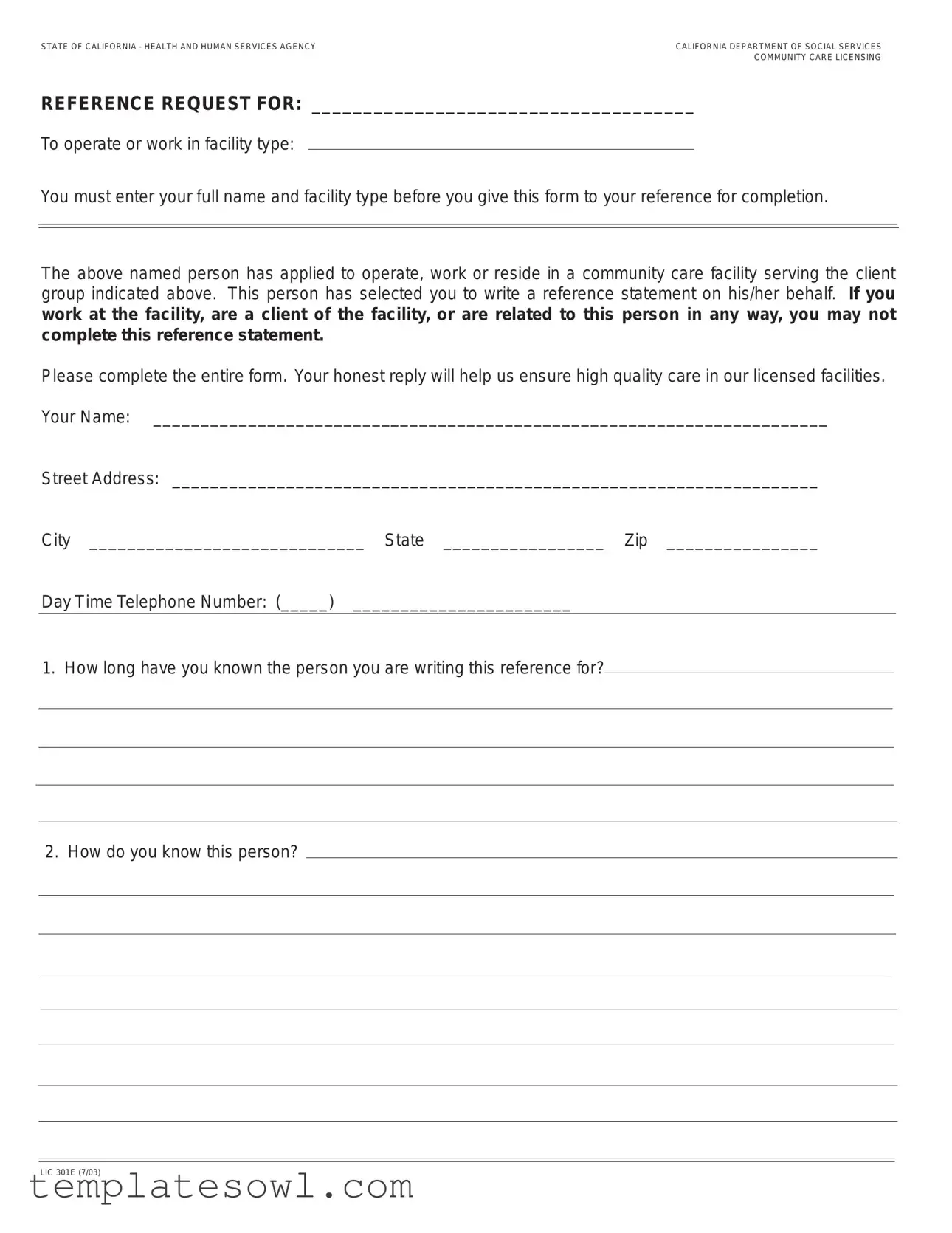Fill Out Your Lic 301E Form
The Lic 301E form serves an important role in the licensing process for community care facilities in California. This form is utilized when an individual wishes to operate, work, or reside in a facility that provides care for specific client groups. By requiring a reference statement from someone who knows the applicant well, the form helps ensure that only qualified individuals are entrusted with the care of vulnerable populations, such as children, the developmentally disabled, or the elderly. The person providing the reference must have no direct affiliations with the applicant, helping to maintain objectivity. The form prompts clear and specific information, asking about the duration and nature of the relationship between the applicant and the reference, as well as the reference’s opinion on the applicant's character and interactions with the intended client group. This process underscores the commitment to high-quality care in licensed facilities by gathering honest feedback from individuals in the applicant's life.
Lic 301E Example

STATE OF CALIFORNIA - HEALTH AND HUMAN SERVICES AGENCY |
CALIFORNIA DEPARTMENT OF SOCIAL SERVICES |
|
COMMUNITY CARE LICENSING |
REFERENCE REQUEST FOR: _____________________________________
To operate or work in facility type:
You must enter your full name and facility type before you give this form to your reference for completion.
The above named person has applied to operate, work or reside in a community care facility serving the client group indicated above. This person has selected you to write a reference statement on his/her behalf. If you work at the facility, are a client of the facility, or are related to this person in any way, you may not complete this reference statement.
Please complete the entire form. Your honest reply will help us ensure high quality care in our licensed facilities. Your Name: _______________________________________________________________________
Street Address: ____________________________________________________________________
City _____________________________ State _________________ Zip ________________
Day Time Telephone Number: (_____) _______________________
1. How long have you known the person you are writing this reference for?
2. How do you know this person?
LIC 301E (7/03)

REFERENCE REQUEST FOR:
3. Please give your opinion of this person’s character.
4.Please describe any interaction you have observed between this person and the client group he/she is requesting to work with. For example: Clients may be children, developmentally disabled children or adults, mentally impaired adults, or elderly.
5.Please add any comments you feel are relevant about this person and his/her desire to work in a community care facility.
PRINT YOUR NAME
YOUR SIGNATURE
DATE
LIC 301E (7/03)
Form Characteristics
| Fact Name | Details |
|---|---|
| Purpose | The LIC 301E form is used to request references for individuals applying to operate or work in community care facilities in California. |
| Eligibility | Individuals completing this form must have a close relationship with the applicant but cannot be related or employed at the facility. |
| Character Assessment | The reference provider is asked to evaluate the applicant's character and provide insight on their interactions with specific client groups. |
| Governing Laws | This form is governed by California Health and Safety Code, particularly laws related to community care facilities. |
| Confidentiality | Responses to the LIC 301E form are kept confidential to protect the privacy of both the applicant and the reference provider. |
Guidelines on Utilizing Lic 301E
Completing the Lic 301E form is an important step in the reference request process. Once you finish filling out this form, it should be submitted to the appropriate parties, ensuring that accurate and honest feedback is shared regarding the individual in question.
- Begin by writing your full name in the designated space at the top of the form.
- Identify the type of facility the individual is applying to operate or work in.
- Input your street address, city, state, and zip code.
- Provide your daytime telephone number, ensuring it is accurate for any follow-up contacts.
- Answer the first question about how long you have known the individual.
- In response to the second question, explain how you know this person.
- Offer your opinion on the individual’s character in the third section.
- Discuss any observed interactions between the individual and the client group in the fourth question.
- Add any pertinent comments regarding their desire to work in a community care facility in the fifth section.
- Print your name again at the end, followed by your signature and the date.
What You Should Know About This Form
What is the purpose of the Lic 301E form?
The Lic 301E form serves as a reference request intended for individuals who wish to operate, work, or reside in a community care facility in California. It aims to gather relevant information about a person's character and suitability for working with specific client groups, such as children, elderly, or developmentally disabled individuals. The information collected helps ensure a high standard of care in licensed facilities by evaluating the references provided.
Who is eligible to fill out the Lic 301E form?
The form must be completed by individuals who know the person applying for a position in a community care facility. However, it is important to note that individuals who work at the same facility, are clients of the facility, or are related to the applicant are prohibited from completing the reference statement. This rule helps maintain objectivity and integrity in the evaluation process.
What kind of information is requested on the Lic 301E form?
The Lic 301E form requests various pieces of information to evaluate the applicant. It includes questions about the duration and nature of the reference’s relationship with the applicant, an assessment of the applicant's character, observations of interactions with the client group, and any additional comments that may be relevant. This comprehensive approach helps create a complete picture of the applicant's qualifications and suitability for the job.
How should the reference submit the completed Lic 301E form?
Once the reference has completed the Lic 301E form, they should return it to the applicant. The applicant is then responsible for submitting the form to the appropriate licensing authority. It is important to ensure that all sections of the form are filled out completely and accurately, as this will be critical for the licensing review process.
Why is honesty important when filling out the Lic 301E form?
Honesty is crucial when completing the Lic 301E form since it directly impacts the applicant's ability to work in community care facilities. A truthful reference statement helps to ensure that individuals who are not suitable for this sensitive work are not placed in positions that could harm clients. The licensing authority relies on accurate information to make informed decisions, ultimately ensuring the welfare and safety of vulnerable populations served by these facilities.
Common mistakes
Filling out the Lic 301E form can be a straightforward process, but several common mistakes can lead to complications or delays. One critical error is failing to complete all required fields. Each section of the form demands specific information, including the reference writer's name, address, and contact information. Incomplete sections may lead to the form being returned or rejected, slowing down the application process.
Another frequent mistake is neglecting to provide a clear and honest assessment. The form requires personal opinions about the individual in question. It's essential to answer the character assessment and interaction sections thoughtfully. Vague or generic responses do not help the review process and may raise red flags regarding the reference's credibility.
Many references forget to indicate their relationship with the applicant. Whether the reference knows the applicant through personal or professional channels significantly impacts the value of the reference. Failing to clarify this relationship could render the feedback less relevant or persuasive.
Additionally, references often overlook the importance of timely submissions. The Lic 301E form must be completed and returned promptly. Delays can halt the application process, causing unnecessary stress for the applicant. Ensure that deadlines are met to keep everything on track.
Some individuals may also misinterpret the instruction regarding who cannot complete the form. If the reference is related to the person applying or currently works with them, they should refrain from completing the reference. Ignoring this guideline can invalidate the submission and complicate matters further.
Finally, many fail to provide complete and up-to-date contact information. The reference's daytime phone number must be accurate. If the Department of Social Services needs to reach someone for clarification, outdated or incorrect information can create hurdles that slow the process down. Always double-check that contact details are current before submitting the form.
Documents used along the form
When applying to operate or work in a community care facility in California, several key documents may accompany the Lic 301E form to ensure that applicants meet the required standards. Each of these documents plays a crucial role in assessing qualifications and maintaining the integrity of care facilities. Below is an overview of four important forms frequently used in conjunction with the Lic 301E.
- LIC 200 - Application for a License: This document initiates the licensing process. It requires detailed information about the facility, including its policies, services, and the applicant's qualifications. Approved applications pave the way for further assessments.
- LIC 500 - Personnel Report: This report gathers information on all employees and volunteers working at the facility. It assesses qualifications, backgrounds, and previous experience, ensuring that all staff meet the state's health and safety standards.
- LIC 610 - Emergency Disaster Plan: A crucial document that outlines the facility's plans for managing emergencies such as fires, natural disasters, or medical crises. This plan must demonstrate preparedness to protect residents and staff effectively.
- LIC 700 - Facility Evaluation Scale: This evaluation tool assesses the physical and operational aspects of the facility. It considers factors such as safety, cleanliness, and accessibility, which are vital for ensuring the well-being of clients.
Completing these documents accurately is essential for the licensing process. They provide a comprehensive overview of both the applicant's qualifications and the facility's preparedness to provide safe, high-quality care. Together with the Lic 301E, they help form a complete picture of the care environment intended for vulnerable populations.
Similar forms
The Lic 301E form serves as a reference request for individuals applying to work in community care facilities in California. It is similar to several other documents used in various professional and reference settings. Below are some documents that bear resemblance to the Lic 301E form, along with a brief description of how they are alike:
- Employment Reference Form: This document requests a reference for a job applicant. It asks the reference about the applicant's work ethic, character, and skills, similar to how the Lic 301E form seeks insights into an individual’s character and aptitude for community care work.
- Volunteer Reference Form: Used to evaluate individuals seeking volunteer positions, this form collects opinions on the applicant’s dedication and suitability. Like the Lic 301E, it emphasizes the importance of the reference's honest appraisal.
- Background Verification Form: This type of form gathers information on an individual’s history, often relating to criminal records or past employment. It parallels the Lic 301E in its aim to ensure that a candidate is fit for a role, prioritizing the safety and trust of vulnerable populations.
- Character Witness Statement: In legal contexts, this statement provides insight into a person's character when required in court. Similar to the Lic 301E form, it relies on personal knowledge and interaction to assess the individual's fitness for a sensitive role.
- School Reference Form: Schools often use this document to evaluate students for scholarships or admissions. It requests opinions on the student’s character and achievements, mirroring how the Lic 301E form asks for assessments of character and specific interactions.
- Professional Recommendation Letter: This letter supports an individual's application for jobs or educational programs. It generally highlights abilities and experiences, akin to how the Lic 301E asks references to discuss the candidate’s qualifications for working in community care settings.
Dos and Don'ts
When filling out the Lic 301E form, there are important practices to follow for accurate submission. Here is a list of things you should and shouldn’t do:
- Do provide your full name and the facility type at the beginning of the form.
- Do answer all questions completely. This ensures that the reference is thorough and helpful.
- Do ensure your contact information is current and accurate so that you can be reached if needed.
- Do maintain objectivity when describing the candidate's character and qualifications. Personal opinions should be avoided.
- Don’t fill out the form if you are related to the person or if you work at the same facility. Conflicts of interest can invalidate the reference.
- Don’t leave any questions blank. Unanswered questions can lead to delays in processing the application.
Misconceptions
Misconceptions about the Lic 301E form can lead to confusion and inefficiencies in the licensing process for community care facilities. Here are seven common misconceptions, along with clarifications for each:
- Anyone can complete the reference statement. This is not true. Only individuals who are not related to the applicant and have no conflict of interest can provide a reference.
- The Lic 301E form is optional. In reality, completing this form is a requirement for individuals applying to operate, work, or reside in a community care facility.
- There is no need for personal observation. Some people believe that general knowledge of the applicant is enough. However, the form specifically asks for observations regarding interactions with the client group.
- Submitting the form guarantees the applicant a license. The truth is, while a positive reference can support an application, it does not guarantee that the applicant will be granted a license.
- Completing the form takes very little time. Many underestimate the time required. Thoughtful reflections on the applicant's character and interactions can take considerable effort.
- The form’s questions aren’t important. Each question is carefully designed to gather relevant information. Ignoring or rushing through them can harm the application.
- References will remain anonymous. References may fear repercussions, but the licensing agency is committed to confidentiality, although the information may be part of the public record.
Understanding these misconceptions can lead to more effective use of the Lic 301E form, ultimately fostering better care in community facilities.
Key takeaways
When it comes to the Lic 301E form, understanding its purpose and how to fill it out is essential for anyone involved in the community care sector. Here are some key takeaways to guide you through the process.
- The Lic 301E form is a reference request for individuals applying to work in community care facilities in California.
- Before giving this form to a reference, ensure you enter your full name and facility type accurately, as it's vital information.
- References must be individuals who know the applicant but cannot be clients, employees, or relatives of the applicant to maintain objectivity.
- The form consists of specific questions that a reference must answer, focusing on character and relevant experiences with the applicant.
- It’s crucial for the reference to provide honest and thoughtful replies because these will play a significant role in evaluating the applicant's suitability for the role.
- Ensure that the complete form, including the reference's name, signature, and date, is submitted to avoid any processing delays.
- Remember that the insights and observations shared by the reference help maintain high-quality care standards in community facilities.
Browse Other Templates
Wells Fargo Check Styles - Solid Blue Leather adds a calming color to enhance your checkbook experience.
Af Imt 220 - The aformentioned information collected assists in maintaining accurate military pay records.
